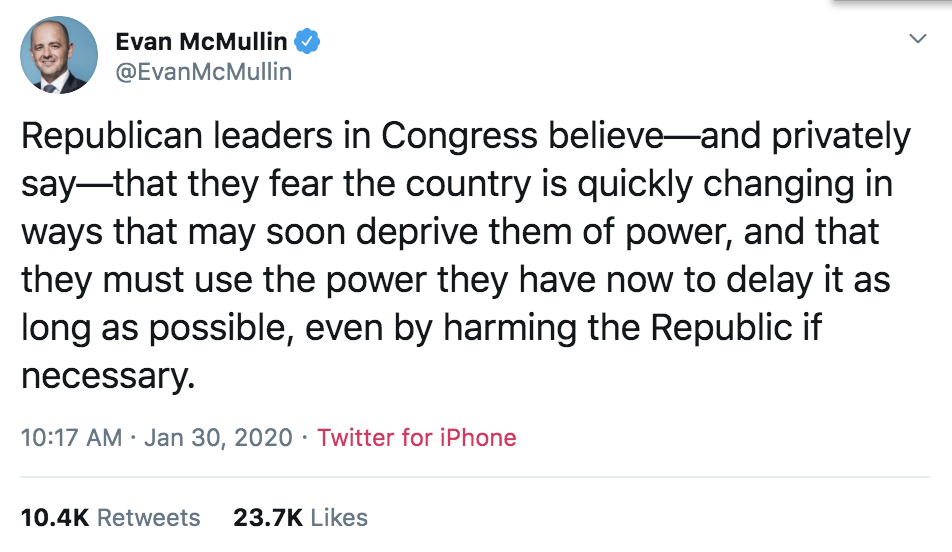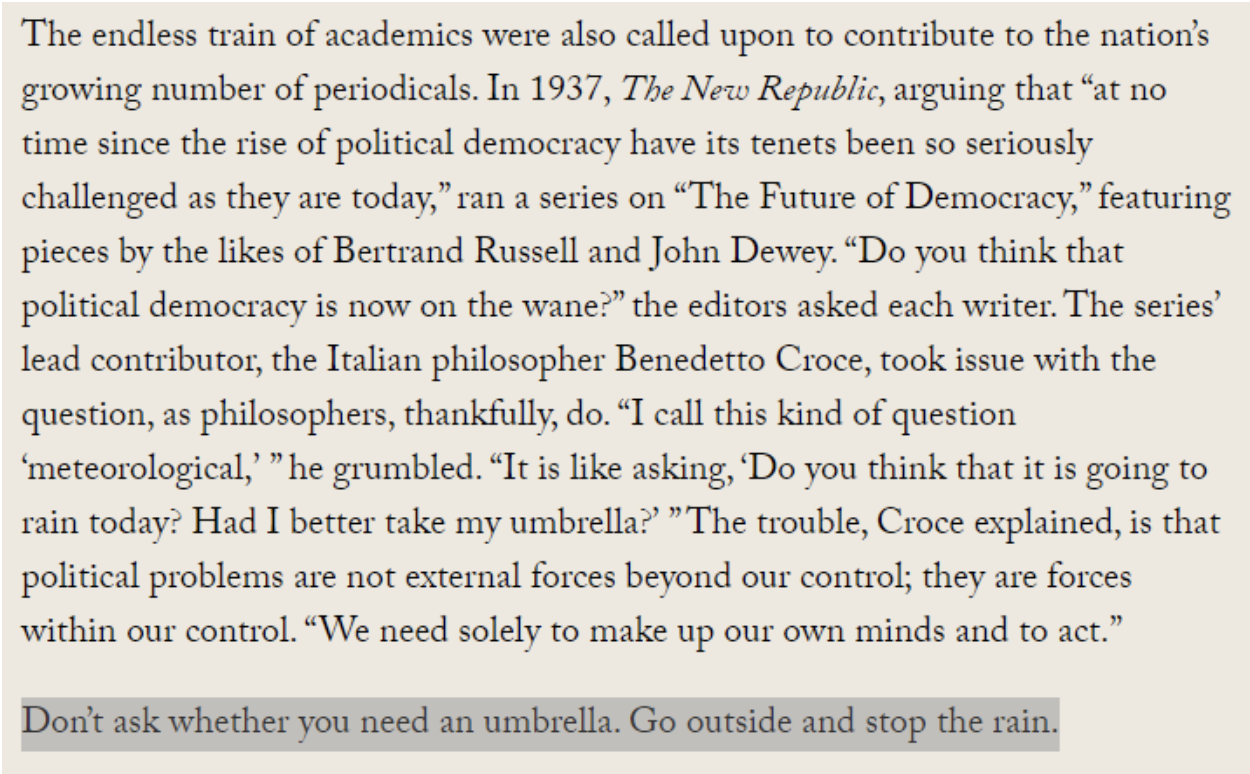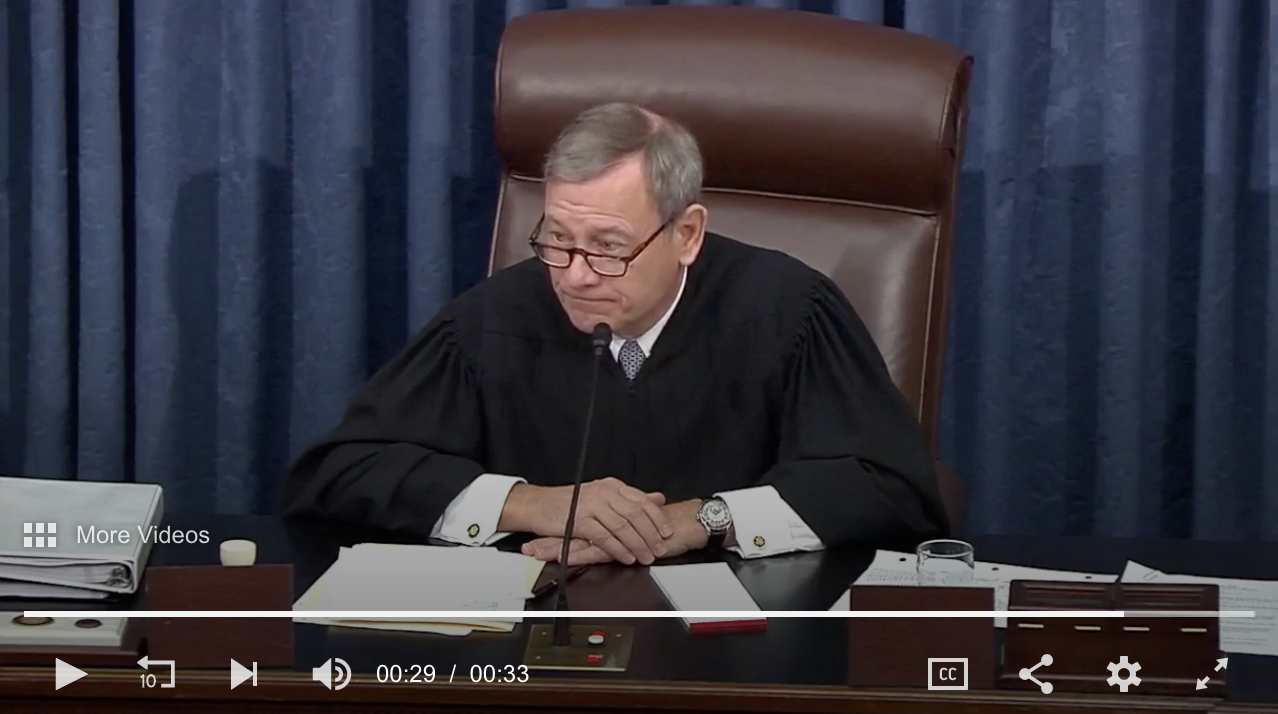|
Indivisibles aren’t just complaining about the raging political storms. We’re going outside to stop the rain. Indivisibles,
We’re as furious as you are about the sham impeachment trial in the Senate. As luck would have it, we were scheduled to send you the first Leah/Ezra newsletter of 2020 today, which gave us a chance to collect our thoughts.
As a reminder, we send these monthly newsletters to give you a sense of what we’re seeing and thinking about for the Indivisible movement, and to get your input. As always, feel free to reach out to us directly on twitter - @ezralevin & @leahgreenb. Let’s get into it.
What the sham impeachment trial tells us about our democracy
The events of the last week are devastating. They’re also totally unsurprising. We knew heading into the Senate trial that the odds of conviction - or even just hearing from witnesses! - were grim. Republicans weren’t interested in the truth. They were interested in covering up the truth to save their own political hides. And that’s what they’ve been doing.
What this trial demonstrates is a clear and terrible truth: the threat to our democracy is much, much bigger than just Donald Trump. If Trump were just an aberration, then there would have been bipartisan outrage at the revelation of his crimes. That didn’t happen. Republican politicians have rallied around him at every step of the way.
That shouldn’t be a surprise. We’ve seen the warning signs for a long time. We saw Mitch McConnell stonewall President Obama’s Supreme Court nominee, Merrick Garland. We saw McConnell on the Senate floor early last year, declaring that voting rights were “socialism” and a “power grab.” We saw House Republicans work in lockstep to oppose all election security legislation. We saw Republicans rely on voter suppression nationwide in 2018 - most devastatingly, in Georgia, where Republican Secretary of State Jack Kemp secured his own election to the Governorship by kicking hundreds of thousands of voters, largely voters of color, off the rolls.
The modern Republican party has decided that it can’t stay in power if it plays by the rules. So they’re rigging the rules to win.
Does that sound radical? Don’t just take it from us. Evan McMullin, a former senior Republican congressional staffer who now leads Stand Up Republic, is someone we disagree with on most social and economic issues. But McMullin never threw his lot in with Trump - not in the 2016 primary, not after Trump clinched the nomination, and not after Trump became President. McMullin has a unique perspective about what’s going on right now - and it goes far beyond Trump. Here’s what he said this week:

We’ve said it before and we’ll say it again: a healthy democratic society would have rejected Donald Trump, the same way a healthy body fights off a virus. What this week confirms is that our democracy is very, very ill.
What we’re reading
Before the vote on witnesses this week, we read Jill Lepore’s piece in the New Yorker, The Last Time Democracy Almost Died. Lepore covers the last world-wide crisis in democracy in the 1930s. Mussolini and Hitler were rising, young democracies were crumbling, and America was confronting its own crisis of confidence in our democratic institutions - at a time when inequality was soaring and large swaths of the population (read Black and brown folks) were disenfranchised. At the time, lectures, articles and books on the demise of democracy were everywhere.
Today, lectures, articles and books on the crisis of democracy are everywhere again. We published the Indivisible book in November on the potential future of American democracy. We’re far from alone. Back in 2018, we read How Democracies Die (guess what it’s about) and One Person, No Vote on the long history of disenfranchising brown and black Americans. Six months before our book came out, Astra Taylor published Democracy May Not Exist, but We'll Miss It When It's Gone, a philosophical exploration on the meaning of democracy. In November, Stacey Abrams - the rightful Governor of Georgia - issued a stirring call for the Democratic candidates to focus on structural democracy reform. Last month Lee Drutman published Breaking the Two-Party Doom Loop, on the dire need for major structural reforms. Last week Ezra Klein’s book Why We're Polarized, covered many of the themes we wrote about, and endorsed many of the same reforms. And next month Dan Pfeiffer publishes Un-Trumping America, which we got an advanced copy of and you’ll want to read if you liked our book.
We -- all of us in the Indivisible movement -- are debating the future of democracy in a time of crisis. But this isn’t just an intellectual debate. If there’s one paragraph we’d like to highlight from Lepore’s piece, it’s this:

Indivisibles aren’t just complaining about the raging political storms. We’re going outside to stop the rain. We’ve been working to stop the rain, with some success, for years now.
How all this connects to defeating Trump
Political storms are raging. It’s up to us to stop the rain.
As we see it, this means a couple simple things. We have to defeat Trump. We have to take the Senate.(1) And we have to ensure that the next President and Congress are an affirmatively pro-democracy President and Congress.
That’s why we’ve spent this election season asking the candidates what they’re going to do to save American democracy. Soon after we published the Indivisible book last year, we released the Indivisible Scorecard for the presidential primary. As we wrote in a Medium post last month, this was a long, in-depth process. After launching the Indivisible Pledge (which every major candidate has signed!), we started talking with Indivisible groups about how best to engage in the primary. At the national gathering last summer, the idea we landed on was the candidate Scorecard - a tool Indivisibles could use to evaluate and push the candidates.
The Scorecard places special emphasis on democracy. What are the candidates' plans for reforming American democracy? How clearly do they see the problems facing us? How bold are their solutions? How high on their priority list are these reforms?
The candidates differ in both their positions and whether they’ll commit to prioritize democracy reform as president. Senator Warren scores highest both overall and in this category of the Scorecard (see detailed metrics for all candidates here), with the most expansive vision for democracy, and a commitment to prioritize it as president. A focus on structural democracy reform is a natural fit with her campaign’s emphasis on corruption. Unsurprisingly, she’s spent her time at the impeachment trial drawing the same connections -- including this great moment when she put Chief Justice John Roberts on the spot:

Mayor Buttigieg comes in second on democracy reform, with both a good platform and a commitment to move first on it. Other candidates scored further down, but still respectably. Senator Klobuchar has a less expansive vision for democracy reform, but she’s committed to making it her top priority. Senator Sanders and Tom Steyer both have more expansive visions, but have prioritized other issues ahead of democracy (health care and climate, respectively).
The lowest scoring candidate on this metric is Vice President Biden. When asked in a recent New York Times interview which of the big democracy reforms proposed by other candidates he supported, he gave a simple direct response: “None.” We’d like to be able to tell you more about Vice President Biden’s views on democracy reform, but we can’t, because he was also the only major candidate to decline to respond to Indivisible’s questionnaire at all.
As best we can tell from Biden’s public comments, he has a pretty simple analysis: the problem is Trump. Once we get rid of him, all will go back to normal. Just a couple weeks ago, Vice President Biden predicted that Mitch McConnell would become “mildly cooperative” once Trump is gone. All due respect, but there’s not a mildly cooperative bone in Mitch’s body.
Now, we are ALL IN to beat Trump (remember the Indivisible Pledge). Beating Trump and winning the Senate is absolutely crucial to saving democracy (read about our plan to take back the Senate here!). But if we’ve learned nothing else from the events of the past few days, we hope that we’ve learned that the major problems facing our democracy go beyond Trump. Saving our democracy will require making the kind of structural reforms that will prevent the next Trump.
Voting in the presidential primary kicks off tomorrow in Iowa. As you’re evaluating candidates for your own vote, we hope you’ll ask them where they stand on this crucial issue of democracy.
As always, we want to hear your thoughts on all of this - because debating democracy is a key part of saving democracy. Rather than use a webform like we’ve done before, instead we want to simplify things a bit: you can just reply directly to this email, and we’ll spend some time this month reading through your replies. If you could, share with us a little about your Indivisible group, where you are, and how you’re working to stop the rain.
In solidarity,
Ezra & Leah
Co-Executive Directors, Indivisible
(1) We’ll spend the rest of this email talking about our plan to save democracy, but if you’re interested, you can also read about the Payback Project, our plan to take back the Senate, and about Organizing Together 2020, a coalition we’ve joined focusing on winning the presidential general election, to learn more about the electoral-focused parts of this work. 
|